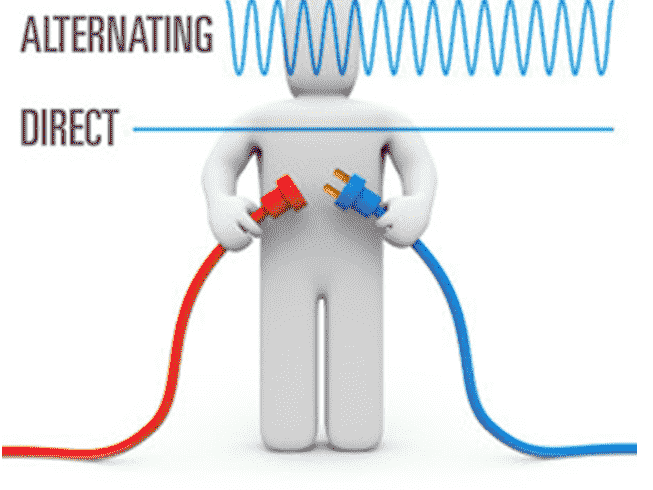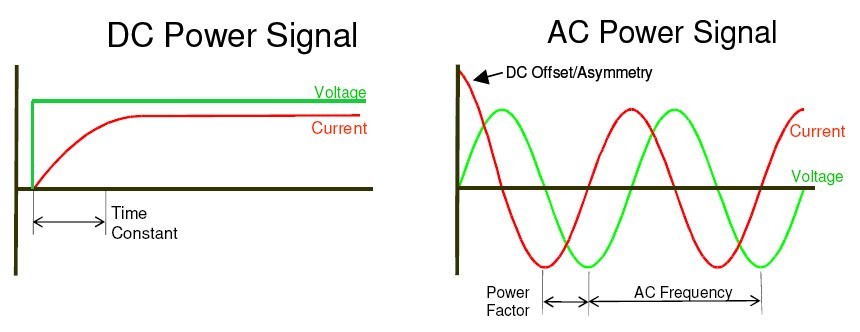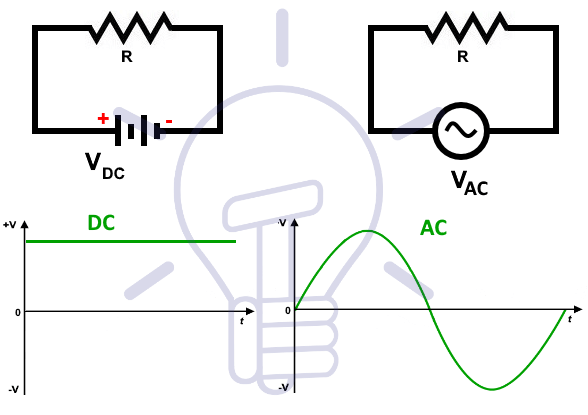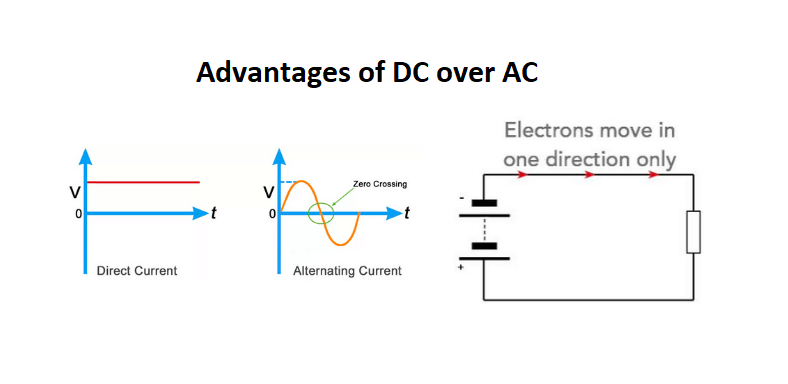Advantages of DC over AC- Direct Current (DC) type of electric power is an emerging complex technological era that has the potential to increase research and development opportunities, inspire novel innovation, improve economic growth, create jobs, and simultaneously enhance the environmental features. DC applications and technology provide the situation to enhance energy efficiency, improve power reliability and quality, and obtain conditions to use clean and renewable energy development.
Only two wires are needed for power transmission through a DC system, using less conductor material than an AC system. DC naturally works well with renewable energy sources like solar and wind. Direct current products are necessary for industrial tools. On Linquip, you may find several Direct Current Products for Sale from a variety of Suppliers, Companies, manufacturers, and distributors.
A full list of direct current services is available on the Linquip website, which covers all OEM fleets. Linquip vendors can assist you with this. Please contact Direct Current Experts to learn more about how to connect with a wide choice of service providers who consistently deliver the highest quality products.
DC systems are beginning to evolve towards substituting AC as a worldwide norm for electricity delivery structure, in many devices, according to the reasons mentioned below.
What are the Advantages of DC over AC?
We use electricity in two types: Direct Current (DC) and Alternating Current (AC). Each type has its benefits and problems in the way it is created and how it can be employed. The main advantage of AC form is that it is simpler to use over long-distance applications. Mains electricity is the AC type since it comes to people over long distances from the great located producing stations distributed throughout the world. However, this advantage is not vital for independent power plants as the electricity doesn’t transmit very far from obtaining to where it is utilized. So, the considerable advantages of DC form are more important for independent power plants.

Advantages of DC over AC in Power Plants
Storing Electricity
The major advantage of DC form is that it is simpler to store than AC type, particularly on a compact scale. Storing electricity when it is created to utilize later when it is required is a noticeable requirement for a hybrid independent power plant. When electricity can be saved, we can use it when we require it, and saving it improves its density, so we can use much power when we tend to run high-powered devices.
When we save electricity, we can turn off the generator complex most of the time, which stores fuel, and we can utilize electricity when our renewable resources like solar cells are not creating electricity. The best method to save electrical energy for small-scale usages is to employ particular batteries with rechargeable storage. We can recover electricity from such storage battery bank efficiently, immediately, and silently when we require it. These batteries need DC electricity, so to obtain the advantages of saving electricity in the storage batteries, we should produce DC electricity.
Providing AC Mains Electricity
In practice, we finally require to present the mains-style AC form since most of the devices that we tend to employ are constructed to operate on mains-style electricity. The considerable benefit of using DC form for an independent power plant is that the electricity in the case of AC can be produced twice as efficiently by employing a diesel DC generator, and transforming the DC type to mains-style AC form, than by producing mains style AC electricity straightly employing a petrol AC synchronous generator.
Variable Engine Speed
An AC synchronous generator should rotate at a specific, single velocity to detect the features of the mains-style electricity that it produces; if more energy is required, the engine cannot increase the speed, if just a little power is required, the system cannot be slowed down.
The properties of the mains-style electricity are identified by the DC to AC conversion procedure in a DC generator, so the speed variation of a DC generator is not an important problem, and the running engine can turn at a range of different speeds. This means that if a huge power is required, the maximum capacity of the engine can be employed by operating it at its maximum velocity; if only a small amount of power is required, the system can be slowed down, saving wear and fuel, and creating less noise.

Supplying the alternator’s magnetic field as the rotating velocity of the AC synchronous generator cannot be varied to provide an electrical load variation; the system’s output should be detected by modification the strength of the magnetic field in its main section. To control the magnetic field, it should be created by employing an electromagnet, introduced as a field winding, which applies some of the electricity created by the generator.
Since a DC system can be identified by changing its velocity, its alternator may use some permanent magnets to produce its magnetic field, and so doesn’t waste any of the electricity that it creates to the field winding. No field winding and controllable speed make a DC system much more effective than a synchronous AC system.
Key Advantages of DC over AC
The key advantages of DC over AC are listed below briefly:
- DC systems are especially more power-efficient than AC power. DC appliances and motors have higher power and efficiency to determine special features. LED or DC-based lighting is approximately 70% more power-efficient than incandescent lights. The higher efficiency resulting from new improvements in DC converter technology permits enhancing the electricity delivery process over long-distance applications.
- Direct current is inherently compatible with clean sources of energy such as wind and solar. These clean sources do not produce power continuously (when the wind blows or the sun shines), needing particular batteries in some applications for the system to supply reliable sources, and also need an energy conversion interface on the grid. A Solar photovoltaic is a DC energy source inherently, as are batteries, making DC form a more compatible arrangement.
- Energy source integration is improved. An energy source is needed to enhance the potential utilization of clean energy supplies. Most power storage techniques are DC-based (basically in the form of battery techniques), making opportunities for developed integration efficiencies and decreased running losses.
- Electronic devices operate on DC power. There is a waste of 8% to 22% when AC type is converted to DC form. The increasing demand for electronic devices makes a higher requirement for DC energy. Removing these conversion wastes from AC type to DC will become even more vital, and will motivate a change to DC form, and need improvements in modern energy conversion techniques.
- DC systems and Hybrid AC/DC micro-arrangements are being improved. Micro-grid systems can effectively combine local power production with the basic power grid to serve defined end-use powers efficiently; increase reliability, particularly under disturbance situations, and make opportunities to sell and buy energy to reduce power costs for the consumers.
- The technology required to obtain the advantages of DC form in homes, data centers, and communities is making special advances. DC type is already in utilization at the “bottom of the pyramid,” for instance, in rural China and India, since the normal AC type does not reach there. Four regions in India are examining with supplying DC energy to homes.
- Today, the most remarkable new consumers of electric energy are the big companies, including Apple, Google, Visa, etc. at the “top of the pyramid,” which use computer data centers and great server farms. They require DC form as electronics basically require DC sources. New improvements for DC systems are investing in local DC energy production in order to guaranty 24/7 reliability with zero downtime and increase the efficiency of the total system.
- Electric cars use DC sources of power, and their batteries can be recovered employing DC energy in a small value of the time required for charging them. For example, smart villages that utilize DC power are being designed in Europe, and electric cars are purposed as part of the storage setup for clean power.

- New techniques provide local, clean, distributed production of DC sources. Wind, second-generation clean biomass, Solar, and low-cost, innovative fuel cell models that utilize natural gas are perfect for green, local energy production. DC structure will help to develop the combination of such sources into the configuration and improve their whole environmental and economic value proportion.
- Some of the new long-distance transmission paths in the world use the ultra-high voltage DC (UHVDC). For instance, in the U.S., the modern transmission cables from extreme wind and solar farms in the mid-west and western regions are being planned to use HVDC, in addition to the development of HVDC economic transmission projects throughout the area. There are already relatively 20 HVDC setups running in the U.S. and Canada.
- HVDC transmission system is less expensive than AC type at a particular distance for energy delivery due to the recently improved disruptive techniques involving special semi-conductors. Other esoteric practical reasons (such as removing the “skin effect” that increases with AC type) and decreased wastes through advanced energy converter designs improve the change to DC form.
- Moreover, the cost of HVDC systems is less as the thickness of the lines can be lower, and because one less wire is needed (three-phases for AC vs. two poles for DC). As a result, many of the main reasons why different countries went with AC type at the turn of the 20th century are no longer related. Today, there are important economic reasons and sustainability-relative incentives to fund in DC systems.
- Modern cities and villages are being designed in Europe and China that will be totally DC powered. In green-field usages, from source and delivery structure to end-use sections, complete DC system ideas and functions are being noticed in many developing regions of the world. There are several benefits to use DC systems as we look to electrify more residential and industrial parts of the world.
- There are not reactive wastes (inductive and capacitive) that influence, in particular, the long-distance applications, and this allows, if necessary, the power distribution employing underground wires. This would be impractical with AC form due to the capacitive wastes. This is the main concept to employ the common open-air distribution for alternating current systems.
- In particular, wires with large diameter are required (since high currents should be distributed), the skin effect increases based on the 60 or 50 Hz frequency of the AC. This forces to mix up the system splitting the simple wire into more wires having a complete section as same as the single one. It is not usual for AC systems with single wires, including a diameter greater than 15 mm.
Conclusion (Heading 2)
There are practical advantages and features to show the benefits of DC systems in industrial applications, especially in independent power plants. As discussed before, the main advantages of DC over AC are that DC systems are simple to control variables including torque, velocity, etc. based on certain properties required for electrical drives. According to the modern technologies used in industries to control and automation (PLC, Soft Starter, VFD, etc.), DC power becomes more efficient, convenient, and cheap for industrial aims.
Download Advantages of DC over AC PDF
Buy Equipment or Ask for a Service
By using Linquip RFQ Service, you can expect to receive quotations from various suppliers across multiple industries and regions.
Click Here to Request a Quotation From Suppliers and Service Providers
Read More on Linquip
- What are the Advantages of DC over AC?
- What is the Working Principle of DC Generator?
- Difference between AC and DC generators: An easy to understand guide
- What are the parts of AC Generators?
- DC Motor Efficiency
- All About DC Motor Types and Their Applications
- The Good Guide to Types of Electric Motors
- Types of Generators: Learn the Basics, Get the Most Out f it!
- DC Motor Working Principles : The Most Compendious Reference
- Parts of DC Generator: Explanation of Parts, Working, Types, Advantages & Disadvantages
- Diesel Generator Parts: A Complete Description
- What are The Electric Generator Parts?
- What is AC Motor? Types, Principles and Constructions
- A complete Guide to The Difference Between Stepper Motor and DC Motor
- Everything You Need To Know About The Difference Between DC Motor and AC Motor
- A Simple Guide to the Difference Between Motor and Generator
- Types of Electric Circuits: All Classification with Application
- Types of Circuit Breaker: A Basic Guide to Know Different Classifications
- Everything You Need to Know About Working Principle of AC Motor
- Your Guide To The Working Principle Of DC Motor




Actually terrific details. Extremely easy to understand, thanks.
Thanks for visiting our website, Jana! You can also visit our Industrial Equipment page, where you can find various equipment based on your application and demand.